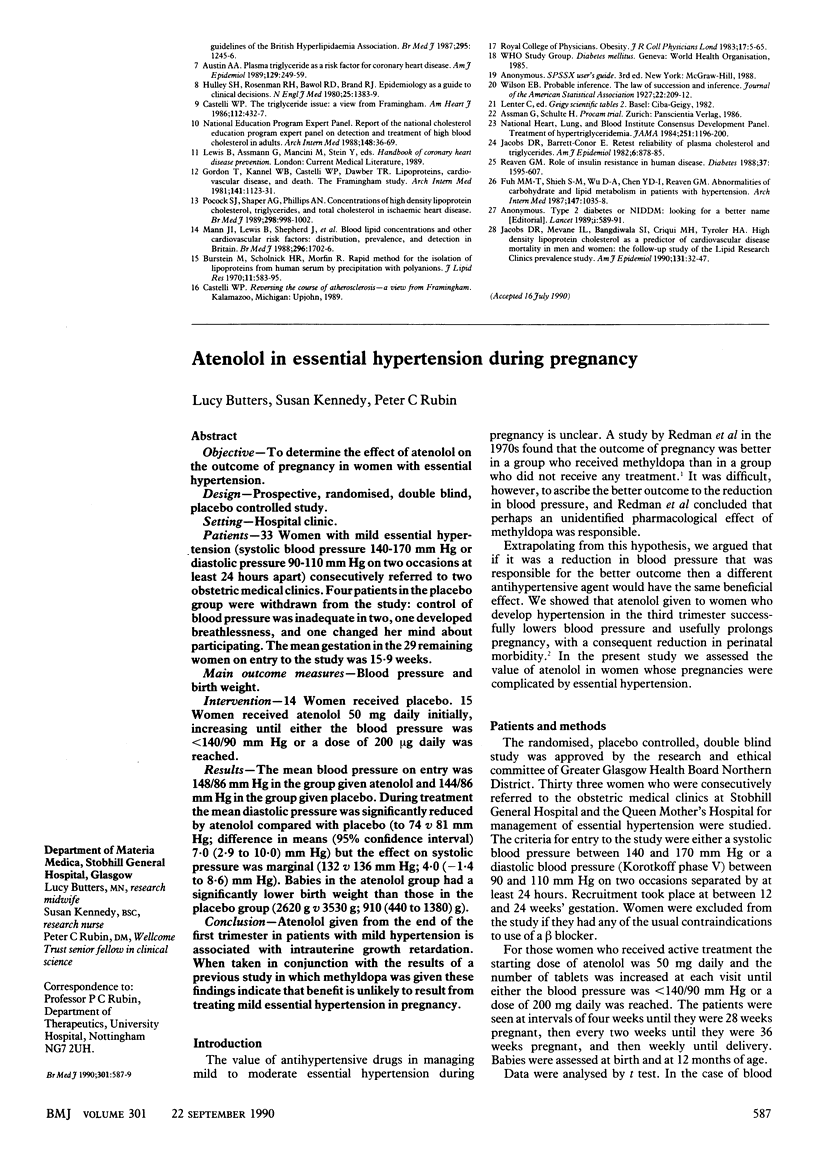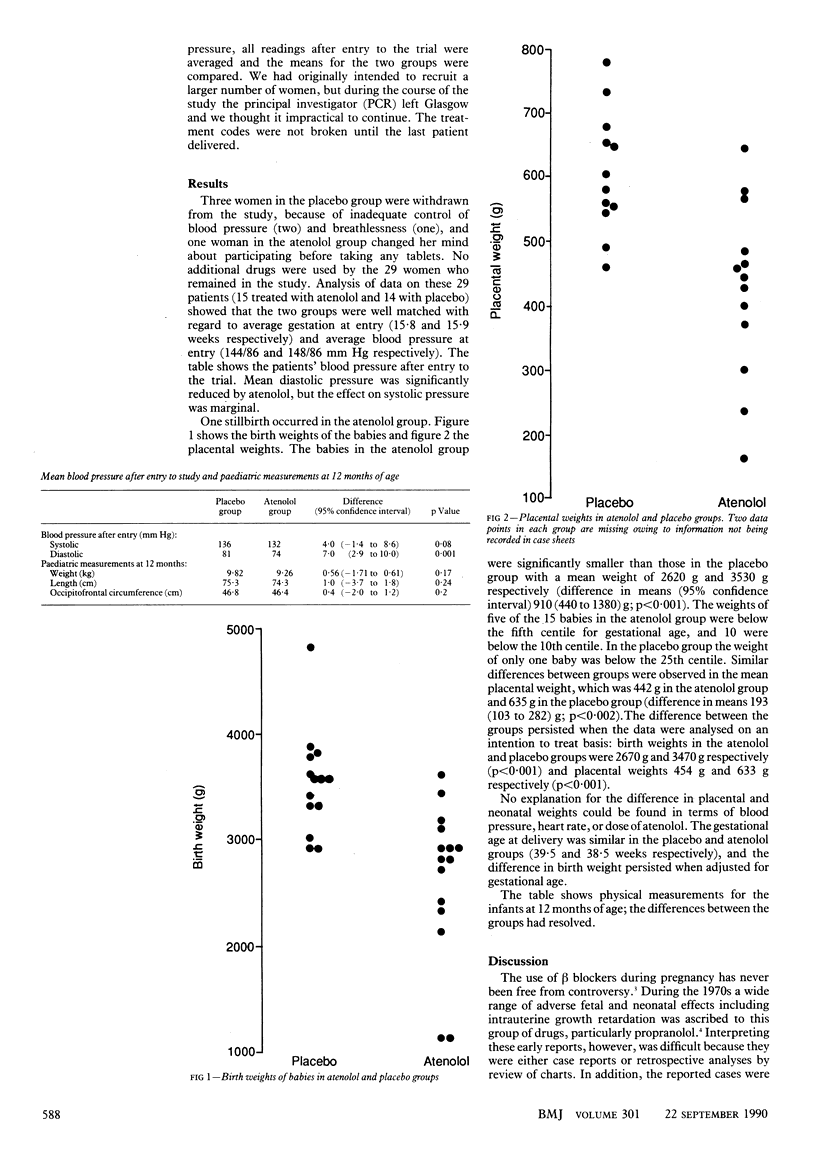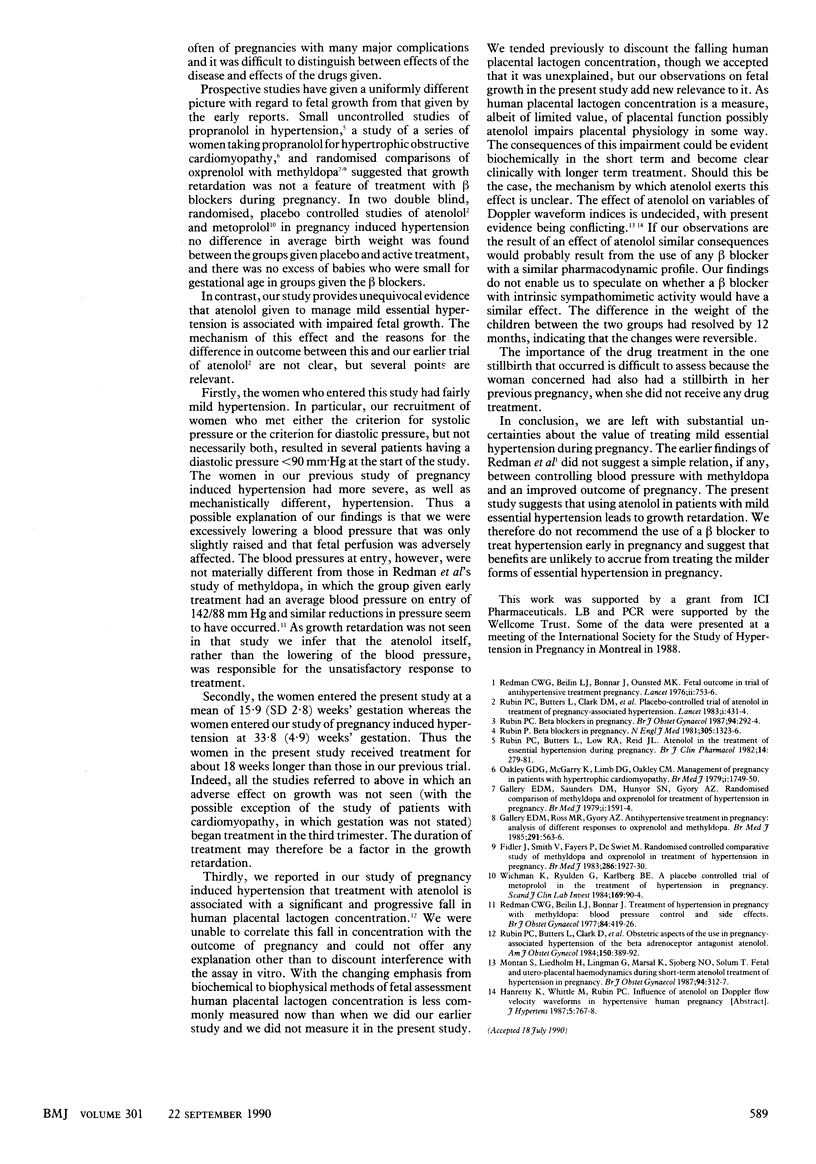Abstract
OBJECTIVE--To determine the effect of atenolol on the outcome of pregnancy in women with essential hypertension. DESIGN--Prospective, randomised, double blind, placebo controlled study. SETTING--Hospital clinic. PATIENTS--33 Women with mild essential hypertension (systolic blood pressure 140-170 mm Hg or diastolic pressure 90-110 mm Hg on two occasions at least 24 hours apart) consecutively referred to two obstetric medical clinics. Four patients in the placebo group were withdrawn from the study: control of blood pressure was inadequate in two, one developed breathlessness, and one changed her mind about participating. The mean gestation in the 29 remaining women on entry to the study was 15.9 weeks. MAIN OUTCOME MEASURES--Blood pressure and birth weight. INTERVENTION--14 Women received placebo. 15 Women received atenolol 50 mg daily initially, increasing until either the blood pressure was less than 140/90 mm Hg or a dose of 200 micrograms daily was reached. RESULTS--The mean blood pressure on entry was 148/86 mm Hg in the group given atenolol and 144/86 mm Hg in the group given placebo. During treatment the mean diastolic pressure was significantly reduced by atenolol compared with placebo (to 74 v 81 mm Hg; difference in means (95% confidence interval) 7.0 (2.9 to 10.0) mm Hg) but the effect on systolic pressure was marginal (132 v 136 mm Hg; 4.0 (-1.4 to 8.6) mm Hg). Babies in the atenolol group had a significantly lower birth weight than those in the placebo group (2620 g v 3530 g; 910 (440 to 1380)g). CONCLUSION--Atenolol given from the end of the first trimester in patients with mild hypertension is associated with intrauterine growth retardation. When taken in conjunction with the results of a previous study in which methyldopa was given these findings indicate that benefit is unlikely to result from treating mild essential hypertension in pregnancy.
Full text
PDF


Selected References
These references are in PubMed. This may not be the complete list of references from this article.
- Fidler J., Smith V., Fayers P., De Swiet M. Randomised controlled comparative study of methyldopa and oxprenolol in treatment of hypertension in pregnancy. Br Med J (Clin Res Ed) 1983 Jun 18;286(6382):1927–1930. doi: 10.1136/bmj.286.6382.1927. [DOI] [PMC free article] [PubMed] [Google Scholar]
- Gallery E. D., Ross M. R., Gyory A. Z. Antihypertensive treatment in pregnancy: analysis of different responses to oxprenolol and methyldopa. Br Med J (Clin Res Ed) 1985 Aug 31;291(6495):563–566. doi: 10.1136/bmj.291.6495.563. [DOI] [PMC free article] [PubMed] [Google Scholar]
- Gallery E. D., Saunders D. M., Hunyor S. N., Györy A. Z. Randomised comparison of methyldopa and oxprenolol for treatment of hypertension in pregnancy. Br Med J. 1979 Jun 16;1(6178):1591–1594. doi: 10.1136/bmj.1.6178.1591. [DOI] [PMC free article] [PubMed] [Google Scholar]
- Montan S., Liedholm H., Lingman G., Marsál K., Sjöberg N. O., Solum T. Fetal and uteroplacental haemodynamics during short-term atenolol treatment of hypertension in pregnancy. Br J Obstet Gynaecol. 1987 Apr;94(4):312–317. doi: 10.1111/j.1471-0528.1987.tb03097.x. [DOI] [PubMed] [Google Scholar]
- Oakley G. D., McGarry K., Limb D. G., Oakley C. M. Management of pregnancy in patients with hypertrophic cardiomyopathy. Br Med J. 1979 Jun 30;1(6180):1749–1750. doi: 10.1136/bmj.1.6180.1749. [DOI] [PMC free article] [PubMed] [Google Scholar]
- Redman C. W., Beilin L. J., Bonnar J. Treatment of hypertension in pregnancy with methyldopa: blood pressure control and side effects. Br J Obstet Gynaecol. 1977 Jun;84(6):419–426. doi: 10.1111/j.1471-0528.1977.tb12616.x. [DOI] [PubMed] [Google Scholar]
- Redman C. W. Fetal outcome in trial of antihypertensive treatment in pregnancy. Lancet. 1976 Oct 9;2(7989):753–756. doi: 10.1016/s0140-6736(76)90597-3. [DOI] [PubMed] [Google Scholar]
- Rubin P. C. Beta blockers in pregnancy. Br J Obstet Gynaecol. 1987 Apr;94(4):292–294. doi: 10.1111/j.1471-0528.1987.tb03093.x. [DOI] [PubMed] [Google Scholar]
- Rubin P. C., Butters L., Clark D. M., Reynolds B., Sumner D. J., Steedman D., Low R. A., Reid J. L. Placebo-controlled trial of atenolol in treatment of pregnancy-associated hypertension. Lancet. 1983 Feb 26;1(8322):431–434. [PubMed] [Google Scholar]
- Rubin P. C., Butters L., Clark D., Sumner D., Belfield A., Pledger D., Low R. A., Reid J. L. Obstetric aspects of the use in pregnancy-associated hypertension of the beta-adrenoceptor antagonist atenolol. Am J Obstet Gynecol. 1984 Oct 15;150(4):389–392. doi: 10.1016/s0002-9378(84)80145-3. [DOI] [PubMed] [Google Scholar]
- Rubin P. C., Butters L., Low R. A., Reid J. L. Atenolol in the treatment of essential hypertension during pregnancy. Br J Clin Pharmacol. 1982 Aug;14(2):279–281. doi: 10.1111/j.1365-2125.1982.tb01974.x. [DOI] [PMC free article] [PubMed] [Google Scholar]
- Rubin P. C. Current concepts: beta-blockers in pregnancy. N Engl J Med. 1981 Nov 26;305(22):1323–1326. doi: 10.1056/NEJM198111263052205. [DOI] [PubMed] [Google Scholar]
- Wichman K., Rydén G., Karlberg B. E. A placebo controlled trial of metoprolol in the treatment of hypertension in pregnancy. Scand J Clin Lab Invest Suppl. 1984;169:90–95. doi: 10.3109/00365518409085385. [DOI] [PubMed] [Google Scholar]



